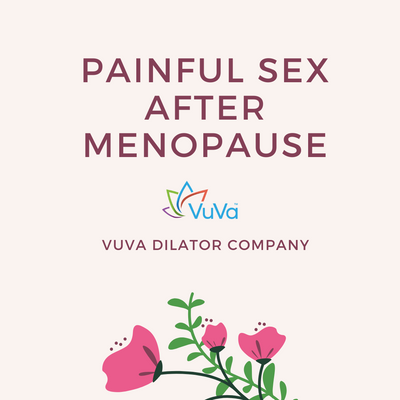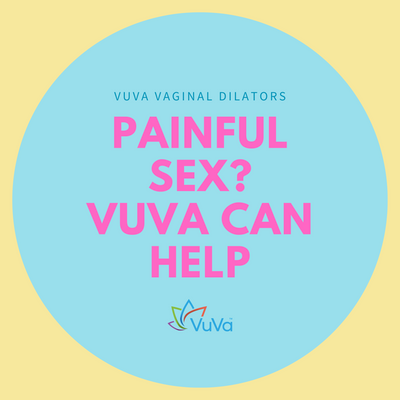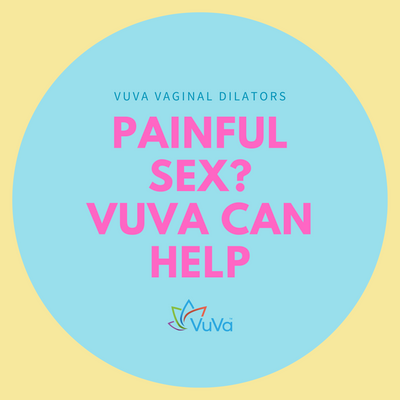
| Tara Langdale
Atrophic Vaginitis and Painful Sex: Causes, Symptoms, and Solutions
Many women expect menopause to bring hot flashes, mood swings, or changes in their menstrual cycles. What often comes as a surprise is the impact menopause can have on vaginal health—especially the onset of atrophic vaginitis and the pain it can cause during sex. If you’re searching for answers about “atrophic vaginitis,” “painful sex after menopause,” or “vaginal dryness and painful intercourse,” you’re not alone. These concerns are common, but with the right knowledge and support, they are also highly treatable.
In this in-depth guide, we’ll explore what atrophic vaginitis is, its symptoms and causes, how it leads to painful sex, and the most effective treatment options—including innovative solutions like VuVa Magnetic Dilators, made in America. Whether you’re experiencing burning, itching, dryness, or pain during intimacy, there’s hope for relief and renewed confidence.
Table of Contents
-
What Is Atrophic Vaginitis?
-
Atrophic Vaginitis Symptoms: What to Look For
-
Why Does Sex Hurt After Menopause?
-
Causes of Atrophic Vaginitis
-
Atrophic Vaginitis vs. Other Vaginal Conditions
-
Diagnosis: How Is Atrophic Vaginitis Identified?
-
Atrophic Vaginitis and Urinary Symptoms
-
Home Remedies and Lifestyle Tips
-
Medical Treatments for Atrophic Vaginitis
-
The Role of VuVa Magnetic Dilators
-
Frequently Asked Questions
-
Finding Relief and Reclaiming Intimacy
1. What Is Atrophic Vaginitis?
Atrophic vaginitis—sometimes called vaginal atrophy—is a condition where the tissues of the vagina become thin, dry, and inflamed, most often due to a decrease in estrogen after menopause. This lack of estrogen leads to changes in the vaginal lining, making it more fragile, less elastic, and prone to irritation. The result? Symptoms like dryness, burning, itching, and, very commonly, painful sex (dyspareunia).
Atrophic vaginitis is extremely common: it affects up to 50% of postmenopausal women, though many never discuss it with their healthcare providers. The good news is that it’s treatable, and you don’t have to accept discomfort as a normal part of aging.
2. Atrophic Vaginitis Symptoms: What to Look For
Women experiencing atrophic vaginitis may notice:
-
Vaginal dryness
-
Burning or stinging sensations (especially during sex)
-
Itching in or around the vagina
-
Painful intercourse (dyspareunia)
-
Light bleeding or spotting after sex
-
Thin, watery, or yellowish vaginal discharge
-
Increased vaginal sensitivity or soreness
-
Tightness or discomfort with penetration
-
Vaginal irritation after using soaps, lubricants, or condoms
These symptoms can be mild or severe, and they often worsen over time if left untreated. Many women also report a decrease in sexual desire, not because of a lack of interest, but because sex has become uncomfortable or even painful.
3. Why Does Sex Hurt After Menopause?
One of the most distressing symptoms of atrophic vaginitis is pain during sex. After menopause, the body produces less estrogen, which leads to:
-
Vaginal dryness: Less natural lubrication means more friction and discomfort during intercourse.
-
Loss of elasticity: The vaginal walls become less stretchy, making penetration feel tight or even cause small tears.
-
Thinner tissues: Fragile vaginal tissue is more prone to irritation, burning, and bleeding after sex.
-
Increased pH: A higher vaginal pH can make infections and irritation more likely.
All of these changes contribute to the burning, stinging, or sharp pain that many women describe when they try to have sex after menopause.
4. Causes of Atrophic Vaginitis
The primary cause of atrophic vaginitis is a drop in estrogen, usually due to:
-
Natural menopause
-
Surgical menopause (removal of ovaries)
-
Breastfeeding (temporary drop in estrogen)
-
Certain cancer treatments (chemotherapy, radiation, hormonal therapy)
-
Medications that reduce estrogen (some for endometriosis or fibroids)
Other factors that can worsen symptoms include lack of sexual activity, smoking, frequent douching, and certain autoimmune conditions.
5. Atrophic Vaginitis vs. Other Vaginal Conditions
It’s important to distinguish atrophic vaginitis from other types of vaginitis (vaginal inflammation), such as:
-
Bacterial vaginosis: Usually causes a fishy odor and gray discharge.
-
Yeast infection: Typically leads to thick, white discharge and intense itching.
-
Trichomoniasis: A sexually transmitted infection with frothy, yellow-green discharge.
Atrophic vaginitis is primarily marked by dryness, burning, and pain (especially during sex), often with thin or watery discharge and sometimes mild bleeding after intercourse.
6. Diagnosis: How Is Atrophic Vaginitis Identified?
If you’re experiencing symptoms like vaginal dryness, burning, or painful sex after menopause, talk to your healthcare provider. Diagnosis usually involves:
-
Medical history: Discussion of symptoms, menopause status, and sexual activity.
-
Pelvic exam: Checking for thinning, redness, or fragility of vaginal tissues.
-
pH test: Atrophic vaginitis typically raises vaginal pH above 5.
-
Microscopic exam: Sometimes a sample of vaginal discharge is checked to rule out infection.
Don’t be embarrassed to bring up these issues—your comfort and quality of life matter.
7. Atrophic Vaginitis and Urinary Symptoms
Estrogen also affects the urinary tract. Many women with atrophic vaginitis notice:
-
Increased urinary frequency or urgency
-
Burning with urination
-
Recurrent urinary tract infections (UTIs)
-
Mild urinary incontinence
These symptoms are sometimes called the “genitourinary syndrome of menopause.” Addressing vaginal atrophy can often improve urinary symptoms as well.
8. Home Remedies and Lifestyle Tips
While medical treatments are often needed, there are steps you can take at home to ease symptoms:
-
Use fragrance-free, gentle cleansers: Avoid harsh soaps, douches, or scented wipes.
-
Wear cotton underwear and loose clothing: This helps keep the area dry and reduces irritation.
-
Stay sexually active if possible: Regular sexual activity (with or without a partner) helps keep vaginal tissues healthy and elastic.
-
Use water-based lubricants: Apply before sex to reduce friction and discomfort. Look for products labeled for sensitive skin and free of glycerin or parabens.
-
Try vaginal moisturizers: These are non-hormonal products designed to hydrate the vaginal tissues (different from lubricants).
9. Medical Treatments for Atrophic Vaginitis
For many women, home remedies aren’t enough. Medical treatments may include:
-
Topical estrogen therapy: Creams, tablets, or rings placed in the vagina can restore moisture and elasticity without significantly increasing blood estrogen levels.
-
Systemic estrogen therapy: Pills or patches may be used if you have other menopausal symptoms, but are not first-line for vaginal atrophy alone.
-
Non-hormonal prescription therapies: Such as ospemifene (an oral medication) or DHEA vaginal inserts.
-
Laser or radiofrequency treatments: These are newer options that use energy to stimulate collagen and improve tissue health, though more research is needed.
Always discuss risks and benefits with your provider, especially if you have a history of breast cancer or other hormone-sensitive conditions.
10. The Role of VuVa Magnetic Dilators
For women with atrophic vaginitis and painful sex, vaginal dilators can be a game-changing part of recovery. VuVa Magnetic Dilators, made in America, offer unique advantages:
-
Gentle, progressive stretching: Dilators come in a set of gradually increasing sizes, allowing you to start small and work up at your own pace.
-
Embedded medical-grade magnets: These are designed to promote increased blood flow and help relax the pelvic floor muscles during use. Enhanced circulation can support healing, reduce muscle tension, and make dilation more comfortable and effective.
-
High-quality, body-safe materials: VuVa Magnetic Dilators are made from non-porous, medical-grade materials that are easy to clean and safe for sensitive tissues.
-
Empowerment and confidence: Many women find that regular use of VuVa Magnetic Dilators not only helps reduce pain and tightness but also rebuilds comfort and self-assurance with intimacy.
How to Use VuVa Magnetic Dilators:
-
Start with the smallest size and use plenty of water-based lubricant.
-
Insert the dilator gently, never forcing it.
-
Practice deep breathing and relaxation during use.
-
Gradually move up to larger sizes as your comfort increases.
-
Use regularly, as recommended by your healthcare provider or pelvic floor therapist.
Dilator therapy is especially effective when combined with topical estrogen or vaginal moisturizers, and can be done at home in privacy and comfort.
11. Frequently Asked Questions
Q: Is atrophic vaginitis the same as vaginal atrophy?
A: Yes, these terms are often used interchangeably to describe thinning, drying, and inflammation of the vaginal walls due to low estrogen.
Q: Can atrophic vaginitis be reversed?
A: With proper treatment—especially topical estrogen and/or regular dilation—symptoms can often be significantly improved or even reversed.
Q: What is the best lubricant for vaginal dryness?
A: Water-based lubricants labeled for sensitive skin and free of fragrances and parabens are best. Silicone-based lubricants last longer and may help with severe dryness.
Q: Are VuVa Magnetic Dilators safe to use with estrogen creams?
A: Yes, they can be safely used together. Always follow your provider’s instructions for application and timing.
Q: Will treating atrophic vaginitis also help with urinary symptoms?
A: Often, yes—restoring estrogen to the vaginal and urethral tissues can reduce burning, urgency, and recurrent UTIs.
12. Finding Relief and Reclaiming Intimacy
Atrophic vaginitis and painful sex after menopause are not things you have to accept as the “new normal.” With a combination of lifestyle changes, medical therapy, and innovative tools like VuVa Magnetic Dilators, you can restore comfort, confidence, and pleasure in your intimate life. Don’t hesitate to talk to your healthcare provider about your symptoms—relief is possible, and you deserve to feel your best.
Ready to take the next step?
Learn more about VuVa Magnetic Dilators and how they can support your journey to pain-free intimacy.
This article is for informational purposes only and does not replace professional medical advice. Always consult a healthcare provider for diagnosis and personalized treatment.













